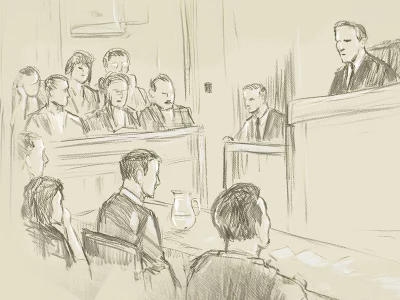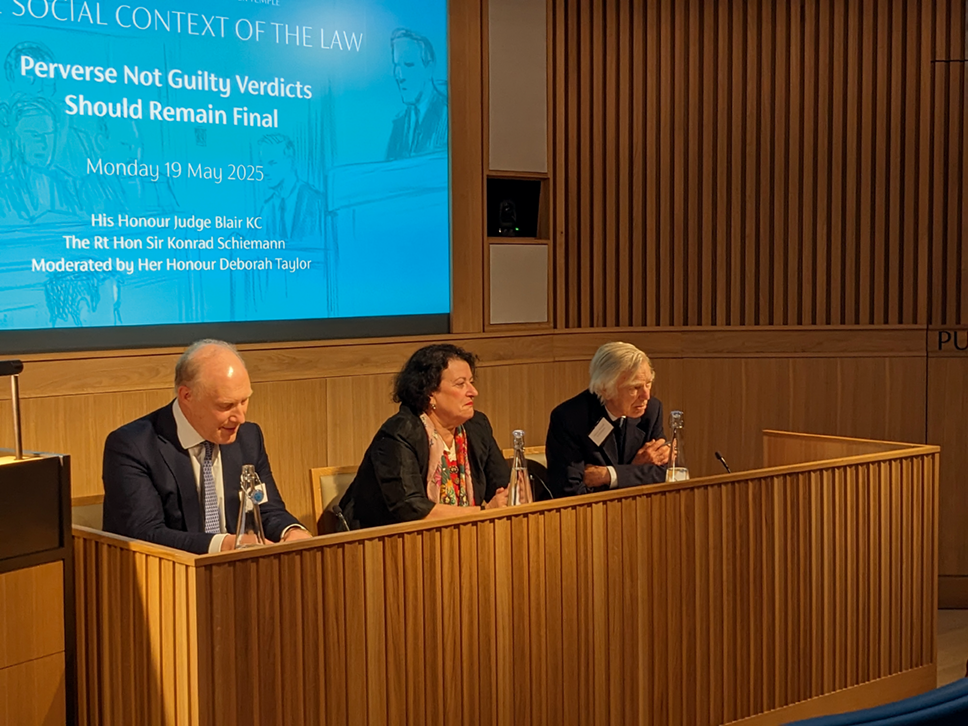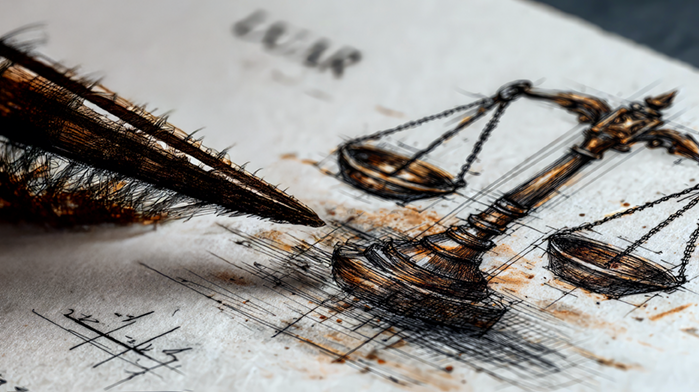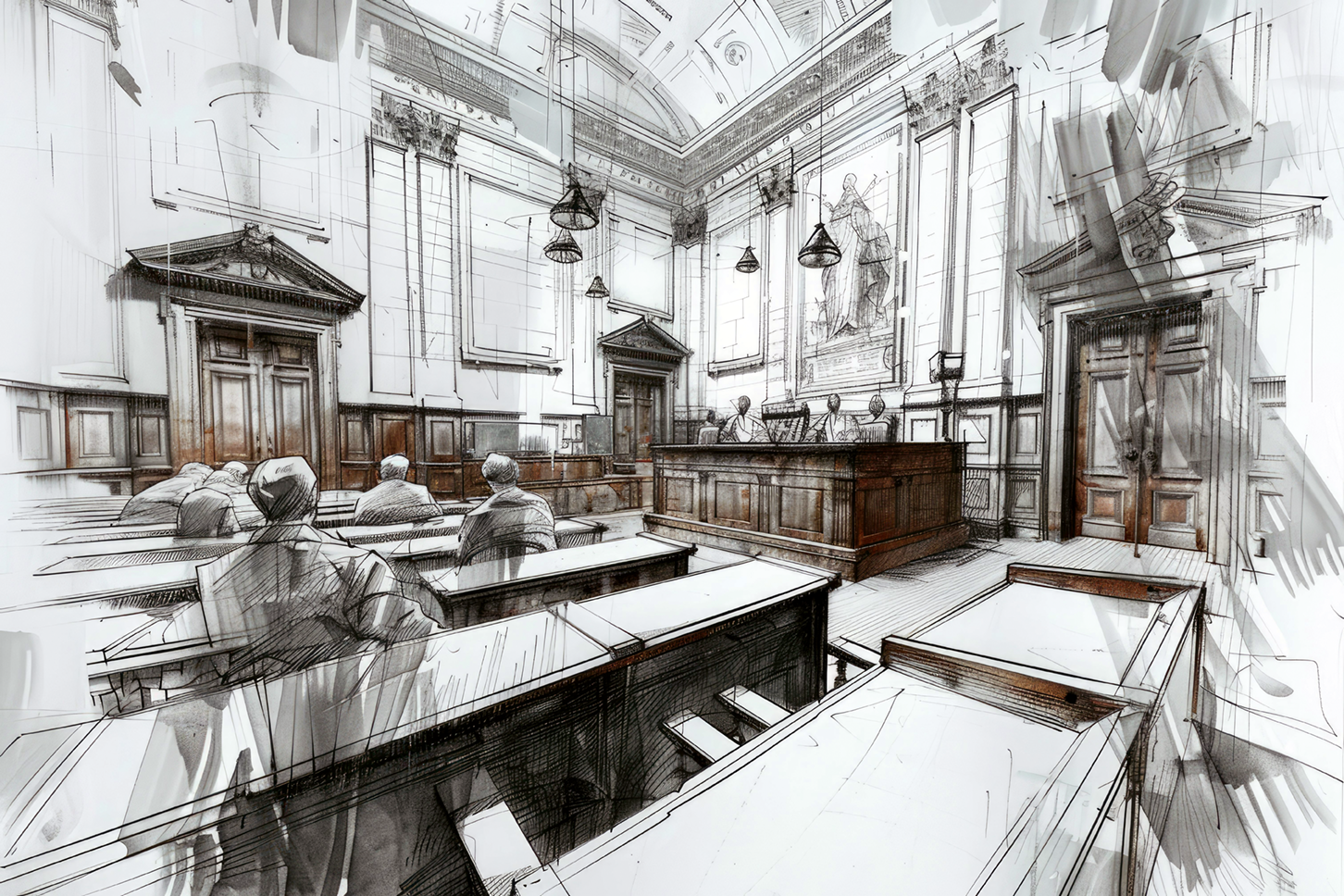

Social Context of the Law: Perverse Not Guilty Verdicts Should Remain Final
Taken from a panel discussion held on 19 May 2025 between Master Peter Blair, Master Konrad Schiemann and moderated by Master Deborah Taylor.
Her Honour Deborah Taylor: What is a perverse verdict? One definition is ‘the verdict of a jury that’s either contrary to the judge’s direction on the question of law, or totally against the weight of the evidence’ or, as in most such cases, both.
For some, the jury system is sacrosanct, described as the cornerstone of criminal justice and, more romantically, as the light that shows that freedom lives. But are we, as a society, content to take perverse verdicts by juries as a necessary component?
If we are to maintain the jury system and rule of law in an era of populism, misinformation and trial by social media, should the prosecution have the right to seek leave to review perverse acquittals? Or are those verdicts an important safeguard of last resort against wrongful imprisonment and government tyranny? Do they assist the development of the law to keep in step with society?
Juries are acknowledged as not infallible. Where a jury is shown to have wrongly convicted an accused person, a higher court can overturn that conviction. Should there also be a similar power for perverse acquittals by juries?
This, of course, is not a totally novel concept in crime. If a district judge sitting in a Magistrate’s Court properly directs himself or herself that there is in law no defence to a charge, but nonetheless decides it is unfair and acquits the defendant, the Crown Prosecution Service would undoubtedly require the judge to state a case for the opinion of the High Court, which would most likely, in turn, return the case to the Magistrate’s Court with the direction to convict.

Is that a power that should now be open to the Crown, or a smaller power, where a jury convicts in the face not only of clear evidence, but a direction from the judge that, in law, there is no defence to the charge? And if not, why not?
Do we consider those sorts of juries as impregnable because the verdicts are of the people, never mind the evidence? Can we ever know, absent a reasoned decision by the jury, how the perverse decision was reached? And can we know if the same verdict would have been reached by a different jury, also giving a verdict of the people on the same evidence and directions from the judge.
His Honour Judge Peter Blair: You will have seen a cartoon of a judge in mid-explosion, with their hands held out wide in exclamation, their face as red as a pillar box and eyes bulging. On occasions, that might secretly have been a picture of my inward reaction to a jury verdict with which I profoundly disagreed. On the whole, I remain completely indifferent to whatever decisions they choose to reach.
In 1960, Mr Justice Stable got in trouble with the Court of Appeal for this legal direction to a jury: “In 10 minutes I shall leave this building, if by that time you have not arrived at a conclusion in this case, you will have to be kept all night. I do not know why you should require all this time to talk about the matter.” He was rewarded with a guilty verdict some six minutes later; the Court of Appeal was less impressed.

Just 290 years earlier, the trial judge really did lock up the jury without food for two nights, leading to a writ of habeas corpus before Chief Justice Vaughan in Bushel (1670) 124 ER 1006. The plaque to that event in the Central Criminal Court records that this established the right of jurors to give their verdict according to their convictions or conscience.
In R v Wang in 2005, Lord Bingham gave the House of Lords’ view and upheld the proposition that there are no circumstances in which a judge is entitled to direct a jury to return the verdict of guilty. A judge can get close to directing this but must always add the proviso: “The verdict is ultimately a matter for you to decide.”
A juror takes an oath to try the defendant and give a true verdict according to the evidence. And since we are not permitted to know what happens in the jury deliberations, and they give us no reasons for their verdicts, we have no way of knowing if they have been true to their ‘oath’ or ‘affirmation’.
We have this tension between the obligation to give a true verdict according to the evidence, and the jury’s right to give their verdict according to their conscience.
Can you, as a barrister, address the jury and invite them to vote according to their conscience, rather than according to the evidence and the legal directions they have been given? Absolutely not! That led me to having an exploding reaction within the trial of those who pulled down the statue of Edward Colston in Bristol.
The defence barrister had the audacity in this closing speech to invite the jury to reach a verdict which put them “on the right side of history”. I expressly directed the jury to ignore such irrelevant pleas and considerations, but to focus instead on the legal defences which the prosecution had to disprove. A barrister cannot invite a jury to decide a case on considerations beyond the law and evidence. But what about a member of the public who holds a placard in the sight of potential jurors, reminding them of the principle sometimes known as jury equity? In 2023, many people were protesting outside Crown Courts up and down the land after the Solicitor General sought to bring contempt of court proceedings against a Mrs Warner for doing just that outside Inner London Crown Court during an Insulate Britain protest trial.
Mr Justice Saini refused permission to bring proceedings against her because she had not interfered with the jurors, she had not been inaccurate in what she had said and there had not been a serious risk of interference with justice. Although there was an initial plan to appeal against his judgment, the new government, when it came in, chose not to.
The principle of jury equity should be regarded as a power, but not a right. In simplistic terms, the King has the power to refuse to sign new legislation into law, but he does not have the right to do so under our constitutional monarchy.
Is it perhaps not true to say that a jury has this power, but it is an old, anachronistic power for which there is no rightful justification to exercise in modern times? We do not have a tyrannical state which demands the pressure valve of a perverse verdict to exist as a jury right. All this legal language and the subtle distinctions between power and right ultimately become somewhat meaningless, because a jury will do what it wants.
I was asked to prosecute saboteurs of the US Air Force base at Fairford in Gloucestershire. I advised the Ministry of Defence (MOD) police that I was pessimistic that we would find a jury who would convict, given B52 bombers had dropped cluster bombs on Baghdad and depleted uranium bunker-buster shells in that city. The MOD decided they were going to proceed. Nonetheless, it went all the way up to the House of Lords on a preliminary question of whether they could run the defence of preventing what they believed were war crimes. Not one of the three jury trials was able to reach a verdict in which at least ten jurors were agreed.
In the retrials, two ended up in acquittals and the third in a conviction. Juries will be juries, whatever the lawyers say and whatever the politicians would like.

Julius Rutherfoord & Co.
Secure Commercial Cleaning
Proudly Cleaning The Inner Temple Since 2012
Sir Konrad Schiemann: Take the case of a landowner who wishes to dig coal on his own land. A number of people invade that land and physically prevent him from doing so. The defence raise a public interest issue, namely, whether burning coal is against the public interest because it aggravates climate warming. Two questions arise: who should resolve the public interest issue, and how should that issue be resolved?
A proper system of law requires that the decision that the jury comes to should be in accordance with the law. If they come to a different decision, the question then arises about what can be done about that?
We accept that prosecutors have the power to decide not to prosecute in particular cases, but I see not the slightest reason why the verdict of a jury should not be capable of being appealed to a higher court to see whether it is in accordance with the law.
If the higher court decides that it is not in accordance with the law, it may be wise for the higher court to send the case back for retrial, and then the prosecution can consider whether indeed there should be a retrial.
But the jury has no right to ignore the law. They are however free to do so without being under any personal risk. When I was trying cases as a judge there were times when the jury reached a perverse verdict and I was delighted that they had done so because that removed from me a terribly difficult sentencing problem.
The one I remember most clearly is a case where a man was charged with rape of his wife in circumstances where they had been married for a very long time, and they had reached a perfectly amicable agreement that she expected to be left alone, except on Fridays. But one day, he came home having had rather too much to drink, forgot which day of the week it was and went ahead all the same.
He turned over and went to sleep. The following day she went to her mother who said, perfectly correctly, that if she had told her husband that it was not Friday, then this was rape. She advised her daughter to report the matter to the police. This the daughter did. The police arrested her husband at work and took him to a hostel and forbad him to go home. The case came in for trial in front of me. I was a rather inexperienced judge at the time and asked more senior judges for advice. They said, “the Guidance is quite clear. You must sentence him to at least three years.”
I asked to see the visitors’ book at the hostel; I saw that the wife had visited him every day.
And I said to the wife, “When did you last see your husband?” And she said, “Oh, I saw him yesterday.” “Oh, was that the first time you’d seen him?” “Oh, no, no, I see him every day.” “Why do you do that?” “Because I want him to come home!”
At this point, I looked at the jury and they were sort of casting their eyes up to heaven. I then had to instruct the jury as to what the law was. The law was perfectly clear, I read to them the definition of rape and said, “You have to decide whether the husband is guilty of the serious crime of rape, or of serious bad behaviour on that particular occasion. And I leave it to you to decide what to do.”

When I was trying cases as a judge there were times when the jury reached a perverse verdict and I was delighted that they had done so because that removed from me a terribly difficult sentencing problem.
They retired and came back after five minutes and found him not guilty. I was very relieved. There have been one or two other cases like that where one has been spared a difficult decision on sentencing. I am grateful to juries who, by a series of acquittal verdicts, in such circumstances can encourage parliament to consider altering the law to bring it into line with what juries appear to think appropriate. Yet it remains for parliament to make the law and to define what the task of the jury is. The jury should not be regarded as having a right to define their own task.
To do otherwise produces a situation of complete uncertainty in the law and the law ought to be certain. We have lived together on the basis that we forego our right to make our own decisions in certain fields for the bigger benefit of living in a society where the law is clear and regulated.

His Honour Judge Peter Blair: The problem, in that parallel, is knowing what the jury’s reasoning is, and our inability to find that out. We are all awaiting Sir Brian Leveson’s proposals about how we are going to cope with the problems in the criminal justice system and the backlogs of trials. I can’t imagine that there will be anything other than a parallel to the magistrates’ appeal, so that if we reach a perverse acquittal in the eyes of the prosecutor, then we will be able to appeal by case stated.
I can see how, when you know what the attempted rationale is for the acquittal, that there should be a permitted appeal. There are very few cases where a jury’s verdict is rationalised by reference to their slightly contrary view of a witness’s credibility.
Her Honour Deborah Taylor: One of those cases was the prosecution of Clive Ponting under the Official Secrets Act, where it was quite accepted, and the evidence was very clear, that he had leaked documents, but the jury nonetheless acquitted him. The question is whether a perverse verdict undermines the rule of law and democracy, whilst the jury may think it upholds democracy.
Sir Konrad Schiemann: In the last analysis it is a question of who should decide. Jurors are not the people who are being paid to decide that in our constitution. It is for parliament to decide how that sort of case should be decided; and parliament can say ‘this is to be decided by the jury’, in which case I have no problem at all. But if parliament has not said that, for the jury to be regarded as having had a right to do this seems to be very odd indeed.
His Honour Judge Peter Blair: In the United States, a perverse acquittal can, in certain instances, involve a judge overturning it and saying it is nonsense. That decision of the judge can and would ordinarily be appealed, and the higher court would decide whether the judge should or should not have intervened. They do it more often than not with inconsistent verdicts or their perception that a jury could not have acquitted on one count and convicted on another.
Sir Konrad Schiemann: The practicalities of producing a reasoned verdict from a jury of 12 people who may have had 12 perfectly different reasons for getting to precisely the same answer, is a huge problem. But that difficulty is, by its nature, inherent in having juries at all.
Her Honour Deborah Taylor: In a sense, that is the difficulty with a perverse verdict, that you simply do not know how the verdict has been arrived at, who arrived at it or in what proportion.
Sir Konrad Schiemann: If the perversity consists of it being against the law, as opposed to a misappreciation of the evidence, it doesn’t matter how the jury came to the conclusion that the law was one to be ignored. It may be a useful guide for future action by other people, but it should not decide the case.
His Honour Judge Blair KC
Recorder of Bristol
The Rt Hon Sir Konrad Schiemann
Her Honour Deborah Taylor
For the full video recording:
innertemple.org.uk/notguilty
